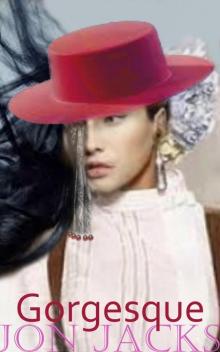Queen of all the Knowing World Read online
Page 10
Desri didn’t find it in anyway surprising that she hadn’t been commanded to take part in any of these events. Instead, she’d been given a seat at one of the long tables, well away from the queen and those of her court.
Despite knowing its real origin, Desri ate the buisoar meat served before her. She and Cranden had decided long ago that to be seen to refuse it at the Academy would lead to accusations that she wasn’t suitable material for a cadet. Besides, Cranden had reassured her, those buisoar captured and served up as food in this way were undoubtedly only those who believed themselves to be beasts and nothing more, any residue of humanity and man’s intelligence that had existed in them having thankfully been extinguished long ago.
Despite this heartfelt reassurance, Cranden never ate the meat himself.
‘For me, that would be too much like cannibalism.’
He had, too, morosely observed the beast Desri had killed earlier that day, referring to it as ‘him’ when he wished it hadn’t attacked them.
‘“He” didn’t act like a man: like you do,’ Desri had pointed out in an effort to assuage his obvious feelings of guilt that this ‘man’ had died because of him. ‘You said yourself: they were men “once”.’
Cranden had nodded in agreement sagely.
‘How many, I wonder, did have more human sensibilities originally; but when they came back to find their loved ones didn’t recognise them – loved ones who chased them away, screamed “Beast!” – how many, Desri, would it send mad? So they became the beast they appeared to be; wanting to die, to fight other beasts, so that like the warriors they had once been, they died an heroic death!’
Today, in particular, the meat left an odd taste in Desri’s mouth.
She took long drinks to wash it down, to wash away the taste. No alcoholic drinks were allowed for the cadets, no doubt to ensure no one made a fool of themselves and thereby, by extension, the Academy too.
This didn’t help improve the already sour attitude of Barane who, for some unaccountable reason – even Desri had to agree with that – had also been made to sit down at one of the long tables rather than take part in the demonstrations. Barane had obviously taken this as an affront to his abilities and dignity, especially when he noticed that Desri had also been denied a place in the activities.
At least, Desri thought, he’s been allowed to sit relatively near to the queen, as befits his standing as the son of a powerful local lord. Not that Desri wanted to be seated any closer; the last time she had been close to the queen, after all, she had been deliberately sent bowling from her saddle by a sharp jab of the royal elbow.
Why had the queen done that?
Desri still, of course, didn’t know.
To a burst of applause, the archers who had been performing in front of the queen and her court left the arena, the butts being rapidly removed by the Academy’s many servants. Before the next act entered the arena, however, the queen’s trumpeters rose to their feet. The trill they played was immediately recognised by everyone present as a call for silence; the queen wished to make a pronouncement.
As silence fell about the Academy’s extensive fields, no one wishing to even perform an action that might result in an unwarranted noise, the queen imperiously stood up, rising up from amongst courtiers who had been commanded to remain in their seats.
This was the first time that Desri had had a clear view of the queen since that day of the hunt. The arena’s many displays had tended to get in the way of any attempt she’d made to catch a glimpse of her. Even when it seemed that a demonstration was suitably small enough to allow a clearer view, the crowds of people craning their necks, stretching on toes, moving forward, had all blocked any sight of the queen she might have had.
Now, at last, with the whole field of people stilled and quiet, Desri at last got her view of the queen.
The queen was dressed in an elaborate mix of light armour and silk veils, all of it either white or cream. Her long red hair was once again allowed free rein, such that it hung about her body, or flicked in the light breeze like the flames of a setting sun reflected across a snow enveloped landscape.
And once again, Desri thought in rapt admiration, she looked magnificent.
Unfortunately, she would be too far away for Desri to hear her speech clearly, if at all.
The queen spoke loudly, confidently; but Desri was right – her voice was too light to have any hope of covering such a distance.
Desri heard her, though. She heard the queen in her mind.
It was praise for the demonstrations she had seen. A typical speech for such an event.
Then, however, there was a sudden change to the pleasantries she was almost tiredly spouting.
It was a complaint; a complaint that so far she hadn’t been allowed to see the top performing cadet in action.
A bored, morose Barane suddenly sat up in his seat.
Being seated nearer to the queen, he could hear her reasonably clearly.
He grinned with malicious satisfaction.
The queen’s complaint continued.
She had also been denied her right to see an unusual pupil she knew attended the Academy.
And that cadet was unusual because she was female.
Now it was Desri who suddenly sat up rigidly in her seat.
Barane glared at her, angry that he had to share the queen’s accolade with her.
Seated just along from the queen, the Academy’s council appeared mortified. They swapped terrified accusatory glares with each other, either unable or denied the right to use the Knowing when so close to royalty. Going by their fearful shaking of head and hands, some were protesting their innocence.
The queen glanced their way, saw this; and smiled.
Desri couldn’t see the queen’s smile, yet she sensed her amusement at the council’s discomfort.
And Desri Knew why she was amused, why the council were being torn apart by their fear of protesting or accepting this unfair judgement on them.
For it had been the queen herself who had commanded that neither Barane nor Desri should take part in the general demonstrations.
‘I can see only one way to make amends for this strange oversight,’ the queen unashamedly continued. ‘I wish to see this girl show us that females are the equal of any man here!’
There was laughter and applause from the crowd.
Who would be foolish enough to contradict or even appear dismayed by the queen’s statement?
Barane clapped, his mouth twisted in bitterness.
In a moment though, that bitter grimace had been replaced by an expression of utmost glee.
‘I want to see how this girl can now fair against the Academy’s top cadet!’ the queen declared adamantly.
‘And,’ she added, with that amused, inner-smile once more, ‘just for the extra thrill of it: let it be a fight to the death!’
*
Chapter 19
1,000 Years Earlier
Imp learned how to kill with every fearsome weapon available to man or beast.
These included a rigid little finger. When forced hard and suddenly against a certain part of the body, it resulted in instant death for the chosen victim.
There were also claws taken from a wide range of animals, the extracts of poisons and venoms, even sharpened scales, teeth and quills.
The furs and skins of animals made for a natural camouflage, enhanced with natural woods or foliage. Disguise included a way of warping the body, a way of walking, that gave the unwary the impression they were being approached by an old woman – until it was too late for them to appreciate the foolishness of their mistake.
The Knowing, of course, could be used to instil a stupor, or at least a sense of stupidity, into the more carelessly guarded.
She sometimes worked with a partner, most frequently Haren, with whom she had both a natural connection and increasingly affectionate relationship (which had to be hidden, with increasing difficulty, from the rest of the Assembly).
She more usually worked alone. And, whenever she had the opportunity, she would carefully cut into the corpse of her victim, expertly slicing her knife into the soft flesh lying just beneath the lower, right-hand rib.
At first, she was surprised to discover that none of those early victims displayed the carved ribs she had found within the bodies of the cellar corpses.
Surprised because she had uncovered a wonderfully carved rib in every body lying in that cellar.
They weren’t just skilfully, gorgeously carved. They also had a form of tattoo-like colouring, the tastefully coloured patterns swirling around the indents and curves of sculptured bone.
Amazingly beautiful, admiringly creative in their oddly satisfying designs, they could have been works of art in their own right, had they been carved into bone that had been removed long ago from the dead. As it was, of course, they had somehow been created within a living, breathing person, with no obvious ill effects to that individual. No scarring of the stomach, either, that could have pointed as to how this might have been achieved.
Only the ribs of the two assassins had been more or less similar, however.
As Imp’s tally of victims increased, she did at last begin to come across more of these carved ribs, but never again in such an accumulated number, as she’d encountered that first time.
She had never heard anyone mention coming across these or similar carvings.
She had never Known anyone even thinking of them.
Then again, the assassins she now associated with were there to kill, not to dispose of the bodies, as had been asked of her for that very first and last time.
You went in. You removed the living person.
If the dead person had to be removed, there were people equally skilled at that. They moved in as the assassin left.
No one knew each other. No one swapped any signs of recognition that they were ultimately connected by the same task.
Even if the assassin had been injured in his or her task, the removal men were under no obligation to help them in any way. It would have been seen as unprofessional to offer help, when the prime concern was getting rid of any trace of the deceased.
Besides, just as the assassin had been well trained in making use of the weak spots within a human body (and, for that matter, within a horse: sometimes you had to swiftly dismount a victim via a simple jab to the throat of his steed), they were also well versed in treating any injuries. The potions extracted from animals and plants that could cause death in certain quantities and placements could heal when used more circumspectly in other ways.
Imp had suffered her fair share of such injuries, including broken bones, deep slashes to flesh and muscle, even a mild version of a disease she had used to wipe out an advancing column of Prenderean troops.
Her most surprising injury, however, had been a relatively simple sword slash, received while killing one of the queen’s generals.
Like Lord Krag, he was well protected. In fact, she had been told that a successful completion of this task would prove to the Assembly that she was ready to take on the long-awaited assassination of Krag.
The general lived in a ranch-style home, surrounded by patrolling guards. There were also a number of lower officers permanently in attendance, each of whom controlled a number of soldiers who lived and slept in small barracks scattered randomly around the ranch.
Working her way past the relatively complacent guards was no problem for an assassin. The problem would be in finding a place to hide in an area where the general would generally frequent.
Imp struck and made her first kill at night. This first kill wasn’t human, however. It was the general’s large Doberman, which slept out in a large pen. She skinned the dog quickly and expertly, throwing the meat amongst the large joints provided for the dog.
She lay wrapped in this skin, waiting for the morning and the arrival of the general. He suspected nothing. His last expression was one of surprise when his own dog rose up to slash his throat.
Her escape, as she had expected, would be the most difficult part of the task.
She moved freely for a while, before someone wondered where the general was and set up a search. His body was almost unrecognisable, strewn amongst the remains of his own dog, the dog’s dinner.
Imp wore his clothes, stripped of its richer adornments and any distinguishing insignia. It allowed her to fool most of the soldiers chaotically rushing past her. By the time she was spotted, she was close to escape, her tethered and hidden horse only a small copse away. She took care of the men blocking her way easily, casually, but suffered a slash just above her stomach.
On reaching the safe house she had prepared earlier, she had heated a knife blade, originally with the intention of cleaning out the cut, of eventually cauterising the wound
Curiously, however, she had dug a little lower, a little deeper, into the flesh, the muscle lying beneath.
Having placed a well-illuminated mirror before her, she gazed at the end of the rib she cautiously, carefully revealed.
It was elaborately, perhaps even beautifully, carved.
*
Chapter 19
1,000 Years Later
It was far from being an elaborate tilting yard, as usually seen at tournaments.
It was just a line of well-spaced posts, quickly hammered into the ground, as per the queen’s instructions.
Desri and Barane had both been given a choice of armour to wear, with neither being told what the other would be choosing.
They would have a lance, a shield, a sheathed sword, a warhorse; this was once again at the insistence of the queen.
The fool’s choice would be to spurn the offer of armour, flattering yourself that it would give you a speed and agility that would take your enemy by surprise. By that erroneous reckoning, any mounted peasant would easily defeat any mounted knight.
You can’t swerve to one side: it’s not allowed, an act of cowardice. Just a slight swerve, anyway, can easily be taken into account by an opponent experienced in using the lance.
You can’t duck: the lance would still strike home. Even an inexperienced user of the lance couldn’t fail to hit such an easy target, particularly as they no longer have to fear being hit by your own poorly held and handled lance.
You can’t use any aspect of the Knowing: not only is it disallowed, but the attendants lining the tilting yard will all possess the necessary powers to block any attempt at its use.
It was a myth, anyway, that armour completely restricted your movement. It was skilfully, purposely constructed. It allowed a surprising amount of easy, flowing action.
Desri had lived for days at a stretch in a suit of armour, to the point where every action had become natural while wearing it. (Yes, those actions too!)
The choice wasn’t between armour or no armour: it was between heavy armour, which would be perfect if expecting a relatively swift victory with the lance, or the lighter version, which would allow you to dismount and fight with the sword if the lance hadn’t decided the outcome.
Barane would be sure of himself: he was highly proficient when it came to use of the lance. He would go for the heavy armour. Light armour against heavy armour in those circumstances would be like choosing suicide over life.
She was already contemplating her death and she hadn’t even left her dress tent! With such a defeatist attitude, she had already lost the fight!
She was allowing everything Cranden had taught her to simply vacate her mind now she was in a position where she needed to utilise it.
It was your opponent you should be playing mind games with, not yourself!
To instil an anger within him that will make him commit mistake after mistake.
And every mistake will make him more frustrated, more open to evermore mistakes.
Conversely, you have to be aggressive, without being foolishly so.
You have to remain under control; and yet not really under control, because you have to move insti
nctively.
To flow through your moves.
To move smoothly, as if you are a part of the very air around you.
And, suddenly, she realised what armour she would have to wear.
*
Chapter 20
1,000 Years Earlier
Like the general Imp had previously assassinated, Lord Krag lived in a large, secluded home.
There were the randomly scattered barracks, too, the lower officers almost permanently in attendance. There was even a dog pen: but one occupied by the lord’s favoured dogs, rather than a dog.
Still, Imp was in no way dismayed by this knowledge. She never used the same device twice. Besides, it was now well known how the other general had died.
Imp didn’t strike immediately. She had made sure that her previous assassination of the general had appeared to be an almost random attack: one undertaken, perhaps, because he had upset the wrong people, rather than being the first of a deliberate series of attacks on the queen’s supporters. In this way, the guard around the lord had gradually become merely professionally adequate once again, as opposed to being nervously alert.
Imp was kept busy in the meantime, with more tasks to fulfil. It also gave her time to make frequent yet unhurried incursions onto the lord’s land, from where she would observe and take note of the layout, the regular patterns of action, the weak spots of the plan of protection surrounding the lord and his family.
The lord, wisely, didn’t have a regular daytime routine. He changed it daily, sometimes by an hour or more, sometimes by just a few minutes. Even when it was changed by just a few minutes, it was more than enough to upset any assassination plan.
His routes were similarly being forever changed. All the regular inspections expected of a military establishment were carried out by the lower ranking officers.
And so Imp decided on her plan of action: she simply had to wait for a night when it was raining hard.
*
Chapter 20
1,000 Years Later

 Heartache High: The Primer
Heartache High: The Primer Americarnie Trash
Americarnie Trash God of the 4th Sun
God of the 4th Sun The Last Angel
The Last Angel Wyrd Girl
Wyrd Girl A Guide for Young Wytches
A Guide for Young Wytches Dragonsapien
Dragonsapien Lady of the Wasteland
Lady of the Wasteland The Cull
The Cull Miss Terry Charm, Merry Kris Mouse & The Silver Egg
Miss Terry Charm, Merry Kris Mouse & The Silver Egg Seecrets
Seecrets April Queen, May Fool
April Queen, May Fool DoriaN A
DoriaN A Died Blondes
Died Blondes Heartache High: The Wakening
Heartache High: The Wakening Cygnet Czarinas
Cygnet Czarinas The Caught
The Caught Sick Teen
Sick Teen The Desire: Class of 666
The Desire: Class of 666 Lowlife
Lowlife The Wicker Slippers
The Wicker Slippers Memesis
Memesis The Rules. Book 1; The End
The Rules. Book 1; The End Gorgesque
Gorgesque Porcelain Princess
Porcelain Princess Self-Assembled Girl
Self-Assembled Girl Heartache High
Heartache High We Three Queens
We Three Queens Eve of the Serpent
Eve of the Serpent Queen of all the Knowing World
Queen of all the Knowing World The Wendygo House
The Wendygo House Blood of Angels, Wings of Men
Blood of Angels, Wings of Men The Boy In White Linen
The Boy In White Linen Elm of False Dreams
Elm of False Dreams Thrice Born
Thrice Born